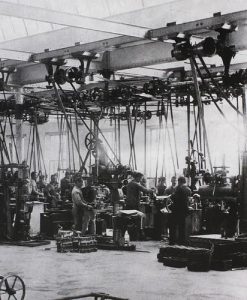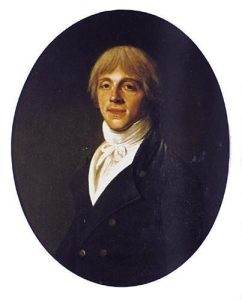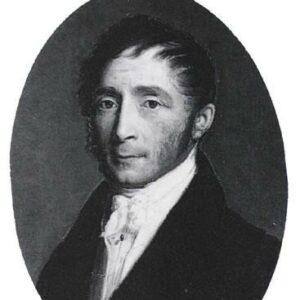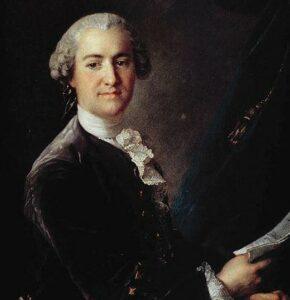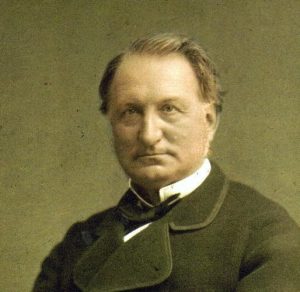From trading to banking
Originally from the Vivarais, a province influenced by the Reformation at an early stage, the descendants of Guillaume André – landowner at Sanilhac and first to bear the name – were converted to Protestantism probably around 1570.
Most of the family returned to Roman Catholicism in the early XVIIth century, with the exception of David André who settled in Nîmes in 1600 as a merchant-dyer. In 1677, 18 years before the Revocation of the Edict of Nantes, he emigrated to Genoa where, together with the Boissier family from Anduze, he was to found a commercial establishment.
The Consul in Genoa makes mention of these Protestants as leaders of a very active community who welcomed numerous refugees fleeing the persecutions at the time of the Revocation of the Edict of Nantes.
Settlement in Nîmes and expansion of the silk-trade
The next generations developed the silk-trade between Nîmes, Genoa and Geneva, where the André had married into prominent patrician families. But since the devoutly Catholic republic of Genoa did not recognize the Reformed religion, the smooth running of the business was assured by the Nîmes branch of the André family until the middle of the XIXth century.
Guillaume I (1685-1746) and Jean III (1689-1764) transformed the Genoa commercial establishment into a banking firm, recognized as such in 1728. At this stage the André family – thanks to Huguenot correspondents in London, Frankfurt and Hamburg – attained the peak of their fortune and social influence.
The André family and Protestantism
The war in the Cévennes, “the Camisards’ war” (1702-1704), greatly perturbed the Protestant region of Languedoc. It was essentially a popular movement and did not affect the bourgeoisie of the larger cities. There is no reference to it in documents concerning the André family at the time. Their presence at the Désert Assemblies is rarely mentioned (1744 and 1747) and yet they remained faithful to their reformed beliefs. Many of the family weddings were blessed by Paul Rabaut (1718-1794), a prominent figure of Protestantism in Nîmes. The children were brought up as Protestants and references are made to « family services ». These were organised by the women of the family and several ladies among « the most highly regarded in Nîmes » attended.
The André family welcomed the relaxing of repressive measures against Protestants enabling them to hold a public course in catechism in 1782 and acquire a place of worship in the town outskirts where Paul Rabaut was to celebrate the 1783 Pentecost service in the presence of the Duke of Gloucester, brother of George III, King of England.
From the French Revolution to the end of the XIXth century
Nîmes was strongly hit by the Revolution, and the André family, much involved in social activities, greatly suffered from it. Jean André (1734-1794) like many other upper middle-class Protestants, had been elected to the Tiers État. He became president of the Tribunal de Commerce, finally established in 1791, after the Nîmes merchant families had been asking for it for decades. The protection of his business interests and those of many of his peers, as well as the excesses of the revolutionary tribunals, led him to favour the counter-revolutionary and bourgeois upheaval called « Fédéralisme » and especially active in the South of France, Marseilles and Toulouse.
But reactions were swift : a number of people were arrested in Nîmes where the “Terror” hit early in January 1794. Jean André was arrested on 17 January, 1794. His summary trial by the sans-culottes was more a revenge on a « rich merchant » obliged to take the blame for the enemies of the revolution. He was executed on 11 July 1794.
Jean André’s son Dominique, who had successfully managed the Genoa branch since 1791, took over the management of the Nîmes commercial establishment after his father’s death. With the help of his uncle, Joseph André (1736-1802) and of his nephews, he managed the establishments of Nîmes, Genoa and Paris, where he finally settled in 1800.
The last of the Nîmes André family, Jean-Jacques, died in 1803.
The commercial establishment owned by Dominique André gradually became a merchant bank ; its expansion was encouraged by the intense economic activity of the first half of the XIXth century. Marie-Jean, Dominique’s son, followed by Ernest his grandson, managed the bank until 1896.
Edward (1833-1894), the other grandson kept the name André alive. He started a military career but resigned in 1863. He then bought paintings and became a politician as representative of the Gard region.
After the 1870 war he quitted political life and used his fortune to have a private mansion built on the boulevard Haussmann in Paris and pursued his collecting activity. He had his portrait painted by a young modest artist, Nélie Jacquemart (1841-1912). He married her in 1881.
Nélie supported her husband’s projects and participated in increasing and organising the collections. She went on increasing them after he died in 1894. When she died without an heir in 1912, she bequeathed all to the Institut de France, in accordance with her husband’s wishes: the boulevard Haussmann mansion with all its collections – known as the Jacquemart-André museum– as well as the Chaalis domain bought in 1902.

